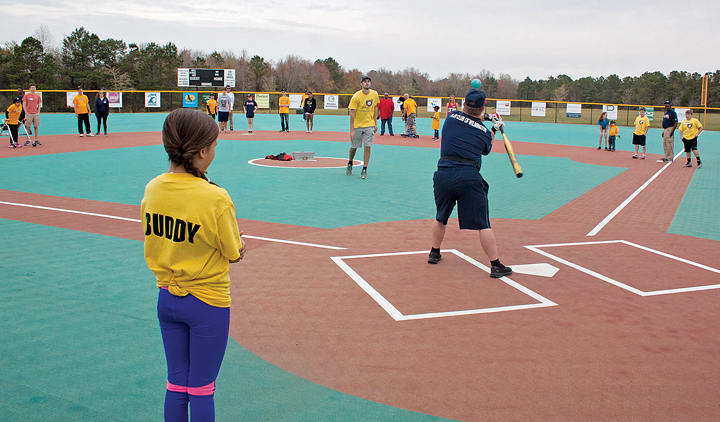“Here comes Harley DeBiasi across home plate!” the announcer at Wilmington’s PPD Miracle Field boomed over the loudspeaker as the crowd cheered.
While 14-year-old Harley has always been an avid sports fan, it wasn’t until the Miracle League of Wilmington was formed that his parents, Steve and Elizabeth, could sit in the stands and watch him play. Harley has a nonverbal form of autism, and the Miracle League provides him and others a chance to safely play, exercise and interact.
The growing league now serves about 150 players, ranging in age from 4 to 65, with a variety of diagnoses from Down syndrome to amputations to cerebral palsy.
Saturdays at the Miracle Field are a family affair for the DeBiasis — Harley plays, his parents cheer, and his 12-year-old sister Anna volunteers as a Miracle League “buddy.” One or two buddies accompany almost every Miracle League player on the field to provide physical and emotional support.
The DeBiasis joined the league not long after it was created in 2013. The ACCESS of Wilmington nonprofit was formed in 2008 to raise funds to build the wheelchair-accessible Miracle Field, a baseball diamond with a 33,000-square-foot rubberized surface, at Olsen Park.
Elizabeth DeBiasi is often afraid to let Harley go off with others, but at the Miracle Field she can sit back and watch him play because, she said, “I know he’ll be safe.”
Other inclusive aspects of the field are the bases, which are flat to prevent tripping, and the equipment. Players are provided with whatever equipment will give them the highest rate of success — part of the Miracle League’s mission to highlight players’ abilities, not their disabilities.
When Harley is up to bat, volunteers place a large, lightweight ball on a tee for him. Other players are able to hit pitches, but use a thick, plastic bat. A few of the older players don baseball helmets and use metal bats.
Someday, DeBiasi said, Harley will be able to bat without a tee. He’s already progressed in the few years since he joined the league. At first, DeBiasi said, he would sit on the ground and scream the entire game. When he did start learning to bat, he would throw the bat at the ball.
Now, baseball games are the highlight of Harley’s week.
“He woke up this morning and he was really fussy,” DeBiasi said, “and we told him, ‘We’ve got a baseball game today!’ Immediately he was calm.”
Though Harley is nonverbal, he starts humming the national anthem whenever anyone mentions his baseball league. UNCW’s female a cappella group performs the anthem before every Miracle League match, and it’s Harley’s favorite part of the game.
Harley, like many of the other players, is a dedicated sports fan but has never been part of a team himself. So Miracle League organizers have incorporated aspects of professional games into games at the Miracle Field, like the pre-game national anthem and an announcer who calls each player’s name and plays their favorite song as they step up to bat.
Their goal is to make the players feel included and celebrated, a feeling many of them haven’t often experienced, Miracle League executive director Jennifer Bell said. It’s an exciting moment for the players, she said, but also for the parents.
“Parents of special needs kids don’t get to see their children being celebrated — being independent, trying something new,” she said.
And it’s not just parents and players who find joy at the Miracle Field. Siblings often get involved as buddies, holding players’ hands for emotional support or pushing their wheelchair around the bases.
The league has between 30 and 90 buddies every Saturday, Bell said, adding, “I hear from buddies all the time that they’re getting just as much out of participating as a volunteer as the actual player is.”
Anna DeBiasi started volunteering as Harley’s buddy, but this season she’s partnered with Holden Overton, a 5-year-old autistic boy with a massive grin and a bright green baseball glove he wore throughout the game.
Although it’s early in the spring season, Anna and Holden have already bonded. After the game, Anna smiled as she described how Holden leaned against her leg when he became tired during the game.
“She looks forward to the games all week,” her mom said.
On top of the emotional benefits, the Miracle League offers physical benefits, too. Those with disabilities can’t just drive themselves to the gym or go for a run outside, DeBiasi pointed out.
Because they don’t have as many opportunities to exercise, Bell added, the Miracle League allows them to “increase their overall health and wellness, because they’re incorporating more movement into their daily lives.”
Word is spreading about the Miracle League, and the local community is uniting behind its message of inclusion. The league had enough players to add two more teams this season and there’s almost never a shortage of buddies. Several restaurants have catered the Saturday games and local businesses, like Harley’s dad’s company, OrthoWilmington, are planning to bring employees out to volunteer.
“Everybody wants to be involved, it just makes you feel good,” DeBiasi said, adding that it only takes a few visits to the Miracle Field to shake misconceptions about those with disabilities.
Bell agreed.
“They get to witness that people with disabilities have abilities,” she said. “It’s not that they can’t do anything, they just need adaptations.”
email [email protected]




